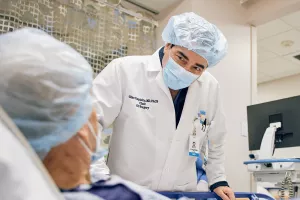Genitourinary (GU) cancer focuses on cancers that affect the urinary system (urology) and the male reproductive system. These include cancers of the bladder, kidneys, penis, prostate and testicles.
Navigating a genitourinary cancer diagnosis
Genitourinary cancer covers different kinds of cancers for different people, so it’s helpful to understand how a diagnosis affects you. For all people, it targets cancer affecting the adrenal gland (located just above the kidneys), the kidneys and the bladder.
For men and assigned males at birth (AMABs), it also covers cancers affecting male reproductive organs, like the penis, prostate and testicles.
To craft the best treatment plan for you, we’ll learn about your personal needs and work with you and your family to choose the best options. Then, we’ll be by your side at every stage of the process, ready to answer questions and help you get back to living life on your terms.

Conditions
Genitourinary cancer is a group of different kinds of cancer, so it’s important to be aware of the warning signs and symptoms that can explain a turn in your health. Get in touch with your doctor right away if you’re experiencing any of the following symptoms:
- Blood in semen
- Blood in urine
- Bone pain
- Decreased urinary stream
- Difficulty with erections
- Discomfort in the pelvic area
- Feeling like you need to urinate, even when your bladder isn’t full
- Lumps in or to the side of the abdomen
- Pain while urinating
- Pain in the back, side or abdomen
- Scrotal swelling
- Sudden, unexpected weight loss
- Swelling in the legs
- Trouble urinating
- Urinary frequency and urgency
These symptoms can be indicators of a type of genitourinary cancer, including:
Testing
Our genitourinary cancer specialists are ready to answer your most pressing health questions with a series of tests, physical exams and a review of your medical history.
Our goal is to pinpoint your condition so we can map the best treatment path forward. We’ll tailor your treatment path around your diagnosis, test results, medical history and more.
To better understand your bladder and surrounding organs, your doctor may recommend one or more imaging studies:
- Computed tomography (CT) scan
- Cystogram
- Intravenous pyelogram (IVP)
- Magnetic resonance imaging (MRI)
- Retrograde pyelogram
- Ultrasound
How we test for different types of genitourinary cancer
Given your symptoms and medical history, we may perform one or several of these tests to check your bladder for signs of cancer:
- Bladder washing: We’ll flush your bladder with a sterile liquid to collect a sample of cells.
- Biopsy: Using a laparoscopic approach, we’ll remove a small piece of bladder tissue that can be evaluated for further testing.
- Cystoscopy: We’ll look inside your bladder using a thin tube with a light and a small video camera on the end.
Urine test: We’ll examine your urine, checking if there’s blood in it.
If you’re experiencing kidney cancer symptoms, your doctor may order an imaging test like a CT scan, MRI or ultrasound to better visualize the tumors. These tools create clear images, which help us find any tumors or other unusual signs.
With early detection, prostate cancer is one of the most curable forms of cancer. Talk with your doctor about your health and family history to learn how often and at what age your prostate cancer screenings should take place.
We’ll use one of these 2 methods to screen for prostate cancer:
- Blood test: We’ll check for a prostate-specific antigen (PSA) in your blood.
- Digital rectum exam: We’ll manually feel for irregularities in your prostate.
Treatments
Your care team is here for you, from diagnosis to recovery, and every step in between. We’ll tailor your care to your specific type of cancer and unique needs.
Treatments will vary based on your type of genitourinary cancer and may include:
- Access to clinical trials
- Active surveillance for low-risk tumors
- Medical therapeutics such as hormone therapy, chemotherapy and tumor vaccines
- Minimally invasive surgery
- Radiation therapy, including state-of-the-art intensity-modulated external beam therapy
Surgical procedures
If surgery is part of your treatment plan, your care team will use the latest laparoscopic and robotic-assisted surgery to reduce your pain, risk and recovery time.
- Laparoscopic surgery (keyhole surgery): We’ll make small incisions in your abdomen to insert a camera and specialized surgical instruments through. This minimally invasive approach to surgery has several benefits over open surgery, like a quicker recovery time and fewer complications.
- Robot-assisted da Vinci Surgical System®: With this advanced tool, we can perform delicate procedures like a laparoscopic nephrectomy — which is removing your kidney through a small incision.
After surgery, we’ll keep a close eye on your health for any possible signs that the cancer has spread or returned. And should you need a combination or treatments, we’ll explore resources from our fellow cancer specialists in bladder, kidney and prostate health.
We’ll personalize your care plan based on your type of bladder cancer, stage of the cancer, severity of symptoms and other medical conditions you’re living with.
Your bladder cancer treatment plan may blend the following surgeries and therapies:
- Neoadjuvant chemotherapy
- Participation in clinical trials exploring experimental approaches or therapies
- Radical and partial cystectomy
- Transurethral resection of bladder tumor (TURBT)
We offer state-of-the-art evaluation and treatment for people living with kidney cancer. To treat your condition as comfortably as possible, we perform the most advanced and minimally invasive procedures. To treat your condition as comfortably as possible, we perform the most advanced and minimally invasive procedures.
We also offer a variety of minimally invasive procedures focused on preserving your existing kidney, such as:
- Cryoablation (uses extreme cold to destroy diseased tissue)
- Laparoscopic partial nephrectomy
- Radiofrequency ablation (uses heat from radio waves to destroy diseased tissue)
We offer an extensive array of the most advanced treatment options for prostate cancer, including:
- Active surveillance
- Brachytherapy (radioactive material is contained within a seed that we implant into the body to destroy nearby cancer cells)
- Cryotherapy
- Intensity modulated radiation therapy (IMRT)
- Image-guided radiotherapy (IGRT)
- Stereotactic body radiotherapy (SBRT)
- Radical prostatectomy
- Robotic-assisted laparoscopic prostatectomy

From regular office visits to inpatient stays, find the healthcare you need and deserve close to home.

Meet the doctors and care team devoted to supporting you every step of the way along your path to better health.